Table of Contents
Generative AI’s Impact Across Industries Who Will Reap the Biggest Benefits?
June 21, 2024

June 21, 2024
The question is not if generative AI will have an impact on an industry, but how much of an impact it will have across several industries. According to a McKinsey study, generative AI (gen AI) characteristics could boost the global economy by up to $4.4 trillion per year. This development in artificial intelligence is altering the way industries work, unleashing a wave of disruptive capabilities that were once science fantasy.
Generative AI is a subclass of machine learning that teaches computers to create content from existing data. Generative AI is revolutionizing many fields, from language and art to creativity and problem-solving.
It can be overwhelming to consider all of the possible AI use cases that generative AI makes possible. A Generative AI consulting company has a great deal to offer anyone working in the healthcare industry seeking more precise diagnoses, finance analysts navigating intricate markets, marketers looking to attract consumers, or educators pursuing individualized learning experiences.
Understanding the most common applications of Generative AI consulting is important because it gives companies a chance to be creative and efficient, which helps them to remain competitive in a world that is evolving fast. It gives people access to new opportunities, boosting their capacities and improving their quality of life.
This article will serve as your comprehensive guide to the top Generative AI use cases across industries, and who stands to benefit the most. We will explore how this technology is reshaping the way we work, create, and live.
Generative AI in Retail and E-commerce
In retail and e-commerce, it is essential to meet customer expectations, and generative AI could hold the key to doing so. AI in retail is transforming the way people shop by making it more efficient, engaging, and personalized.
Inventory Management
By precisely projecting future demand, generative AI consulting is a potent tool for efficient inventory management that helps merchants optimize their stock levels. Its capacity to query large data sets using natural language lowers the possibility of overstocking and understocking while guaranteeing that products are available when customers need them, which increases customer satisfaction.
Shopping Experience
Generative AI is about to transform the shopping experience. Features like a shopping assistant, a search driven by artificial intelligence, and an interior design tool that lets you virtually design your space are all included in this. This will make it possible to have a multifaceted, dynamic, and highly personalized buying experience.
Visual Search
Through the analysis of images and patterns, advances in Gen-AI are revolutionizing the way customers locate things in the digital world. Google is setting the standard, and other companies like Snapchat are following suit with their Visual Search feature, which lets consumers look for things by pointing their camera at a product or barcode. This technology promotes growth, loyalty, and an improved purchasing experience. Personalized learning is the main way that generative AI is influencing e-learning and education.
Gen-AI and Healthcare Industry
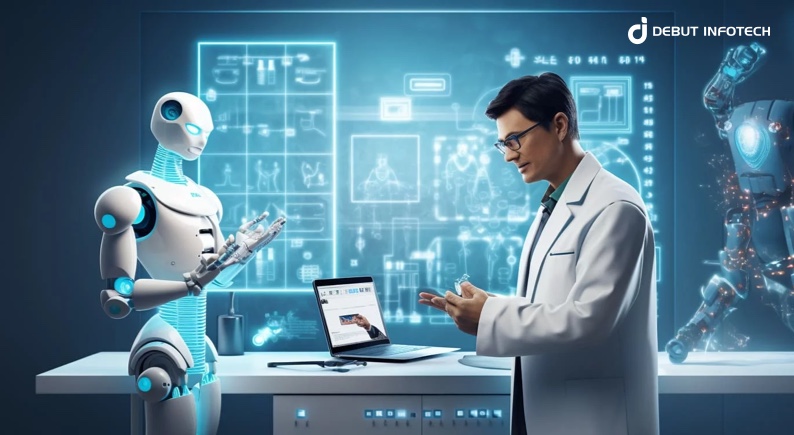
Generic artificial intelligence (AI) has the potential to be an effective ally in the healthcare sector, where accuracy and speed can mean the difference between life and death. However, since human life is involved in some AI use cases, vigilance is necessary. Finding AI use cases that significantly outweigh any possible risks to patients is crucial.
AI-Driven Diagnostics
Due to its ability to analyze large quantities of patient data, pictures, and medical records, generative AI—powered by sophisticated machine learning algorithms—is changing healthcare diagnosis. This technology improves accuracy and shortens the diagnostic timeframe by identifying complex patterns and anomalies.
In order to free up doctors’ time to devote themselves fully to their patients, HCA Healthcare is testing a system that uses information extracted from doctor-patient talks to build medical notes that are subsequently transmitted to the electronic health record (EHR).
Drug Discovery and Development
Generative AI is transforming drug development by simulating molecular interactions and anticipating possible drug targets. This accelerates innovation and lowers R&D expenses, resulting in a speedier pipeline for life-saving medications and serving as a catalyst for significant medical advances.
Personalized Treatment Plans
Personalized treatment plans can be generated for patients by generative AI consulting through analysis of lifestyle factors, medical histories, and genetic profiles. By moving away from one-size-fits-all methods, patient outcomes and quality of life are enhanced. Generative artificial intelligence (AI) holds the potential to transform patient care, medication creation, and disease detection, despite the healthcare sector’s sluggish adoption of new technologies.
Gen-AI and Financial Services
By integrating generative AI, the financial services sector is entering a new, innovative era. The industry, which was previously exclusive to big hedge funds and algorithmic trading firms, is becoming more accessible. The release of big language models for public use further adds to the innovation.
Risk Assessment and Fraud Detection
In the financial sector, generative AI is essential for fraud detection and risk assessment. In addition to improving risk assessment by analyzing intricate variables and market trends, it can scan enormous datasets in real time and identify odd patterns and anomalies. This allows for better-informed decision-making during the loan and investment processes.
Algorithmic Trading
Since algorithmic trading depends on quick data analysis and decision-making, generative AI is perfect for this type of trading. Artificial intelligence (AI)-driven computers can swiftly assess current market conditions, breaking news, and historical data, minimizing human error and improving trading tactics enabling a more efficient financial market.
Customer Service and Chatbots
Generative AI is transforming the financial sector by enabling chatbots using AI to provide 24/7 customer support. In order to improve customer satisfaction and free up human agents for more difficult activities like individualized financial advice, these chatbots employ natural language processing to comprehend and reply to consumer requests. This technology transforms financial transactions, risk assessment, and consumer relationships by streamlining processes, enhancing security, and offering a customer-centric approach.
Gen-AI and Marketing and Advertising
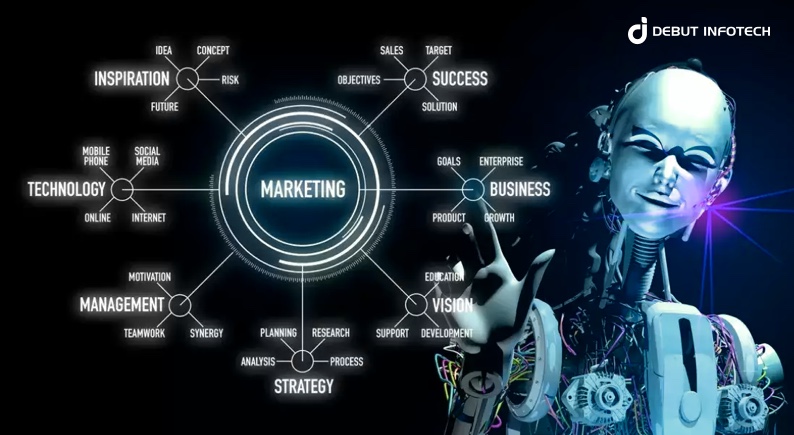
Thanks to generative AI, marketing and advertising have undergone a revolution. Tasks that formerly took hours or weeks can now be completed in minutes without sacrificing creativity. This technology is overcoming obstacles that some first believed artificial intelligence (AI) would be able to overcome, revolutionizing consumer behavior insights, targeted advertising, and content production.
Content Generation
Through the analysis of enormous text, image, and video datasets, generative AI solutions such as ChatGPT and Midjourney assist marketers in producing engaging content. This guarantees consistency, saves time, and improves audience engagement for marketers—all of which contribute to the development of successful marketing campaigns.
Targeted Advertising
Generative AI optimizes advertising by leveraging data analytics and machine learning algorithms. For example, Meta, a $114 billion ad platform, has introduced features for advertisers, allowing quick subtitle copy generation and design tweaks between ads for efficient A/B testing. This marks the beginning of a battle between major digital advertising players.
Customer Insights
Generative AI is transforming the face of marketing by analyzing massive databases of consumer interactions, social media activity, and purchasing behaviors. With its ability to spot patterns and trends, marketers can improve campaigns, hone strategies, and provide interesting content. This data-driven strategy is improving creativity and customization while rethinking brand ties. But since there is now more noise due to this invention, it will probably be more difficult to stand out and be unique.
Generative AI and Manufacturing Industry
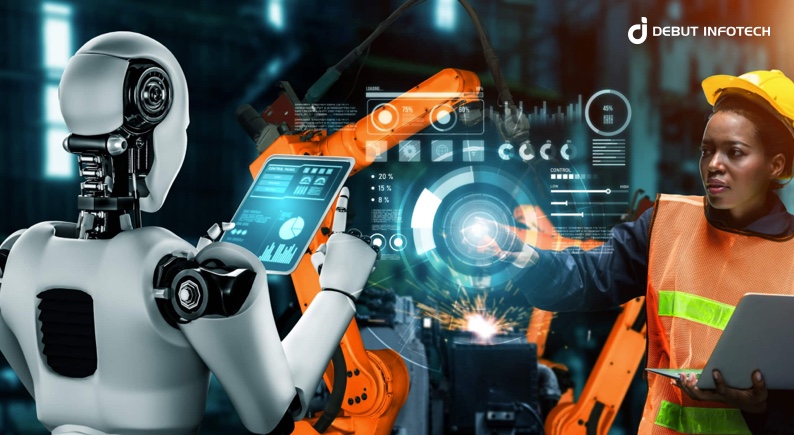
With the introduction of Industry 4.0, manufacturing has entered a new era where artificial intelligence (AI) is integrated. By increasing productivity, efficiency, and creativity, generative AI in particular is completely changing the modern industry. We will explore how Industry 4.0 and manufacturing are being impacted by Generative AI technology in this section, including topics such as supply chain optimization, product design, and predictive maintenance.
Predictive Maintenance
Predictive maintenance, according to Deloitte, saves maintenance costs by 25%, eliminates breakdowns by 70%, and boosts productivity by 25%. A Generative AI consulting company can greatly impact these statistics since it can analyze data in real time and continuously monitor equipment. By taking a proactive stance, production lines run smoothly and efficiency is increased overall by reducing expenses and disturbances.
Product Design and Prototyping
Product design and prototyping are greatly improved by generative AI, which generates and refines design concepts quickly, speeds up the process, and promotes creativity. Additionally, it helps with the creation of 3D simulations and models, which speeds up iteration and lowers the cost of actual prototypes.
Supply Chain Optimization
AI algorithms are transforming manufacturing supply chain management by evaluating enormous volumes of data from logistics, suppliers, and demand projections. This guarantees on-time delivery, reduces transportation expenses, and maximizes inventory levels. This lowers operating expenses while improving customer satisfaction and market response. Innovation and flexibility are fueled by the incorporation of AI in production and Industry 4.0.
Generative AI and Education
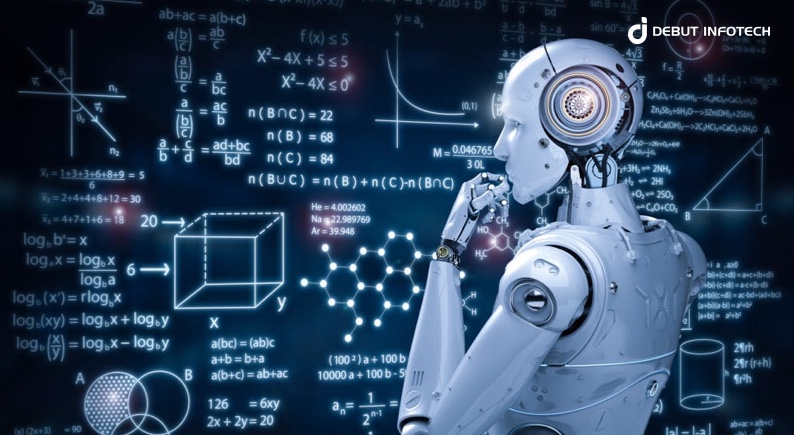
AI algorithms are transforming manufacturing supply chain management by evaluating enormous volumes of data from logistics, suppliers, and demand projections. This guarantees on-time delivery, reduces transportation expenses, and maximizes inventory levels. In addition to lowering operating expenses, this also improves customer happiness and market response. Innovation and flexibility are fueled by the incorporation of AI in production and Industry 4.0.
Personalized Learning
Education is greatly impacted by generative AI since it makes individualized learning possible. Through the analysis of learning styles and student performance data, customized learning paths are generated, guaranteeing that every student receives assignments and information that plays to their strengths and limitations, ultimately maximizing their learning outcomes.
Automated Grading
Generative AI automates grading and assessment in education, lowering instructors’ workload. AI systems assess homework, tests, and quizzes rapidly, reliably, and with immediate feedback. This simplifies the procedure and frees up teachers to concentrate on more important facets of instruction.
Language Learning Tools
Natural language processing, which generative AI uses to comprehend and react to students’ speech and writing, is revolutionizing language learning. These applications improve language learning by providing conversation partners, practice activities, and tailored lessons. With its Roleplay feature, language learning becomes more engaging with Gen-AI technology from Duolingo, a leader in this industry.
By lowering barriers to language acquisition and increasing accessibility, generative AI improves language learning for learners worldwide. Tasks are not only automated; it also improves the efficacy and quality of education by giving students the resources and assistance they need.
Entertainment and AI
Generative AI is revolutionizing the entertainment industry by transforming content creation, consumption, and enjoyment. Let’s see how AI relates to music, art, literature, film and video production, and gaming, enhancing the world of entertainment and content creation.
Content Generation
A Generative AI development company has transformed creativity by allowing for the creation of music, artwork, and literature with a single prompt. Existing melodies are analyzed by music creation algorithms, and AI artists produce visually stunning digital art. This opens up art to a larger audience and simplifies it.
Film and Video Production
The production of movies and videos is being greatly impacted by Gen-AI, which is causing a conflict between AI and Hollywood writers. Video editing software with AI capabilities may automatically clip scenes, evaluate footage, and recommend emotionally compelling parts. AI-generated images from Generative AI platforms have made special effects, which were previously exclusive to high-end productions, accessible to everyone. This improves the caliber and effectiveness of the production of movies and videos.
Gaming
Generative AI is revolutionizing the gaming industry by generating game environments, characters, and storylines, accelerating development and fostering innovation. AI opponents provide engaging and difficult gaming by adapting and learning from player actions. This integration pushes boundaries in entertainment, unlocking new levels of creativity and interactivity.
Energy and AI
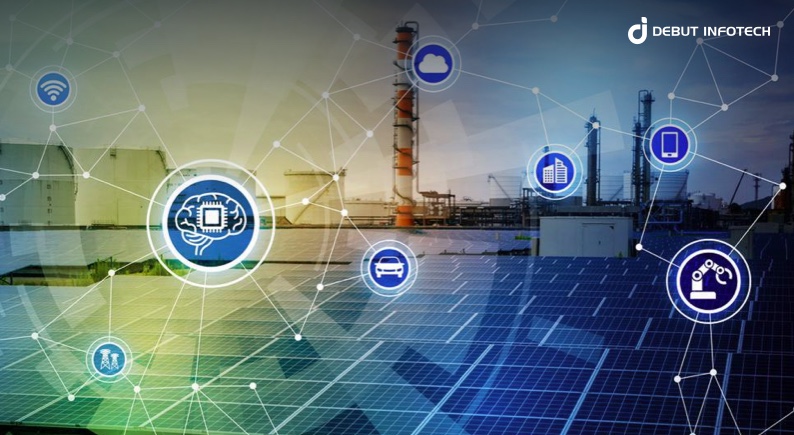
Generative AI is revolutionizing the energy sector by optimizing distribution, advancing renewable energy solutions, and monitoring environmental conditions, making it more efficient and sustainable in the following sections.
Grid Management
Efficient grid management is crucial for a stable energy supply. Generative AI analyzes data from sensors, weather forecasts, and demand patterns to optimize energy distribution, predict peak demand periods, and reroute flows. Gridmatic, a company focusing on AI in climate change, uses AI to build a model of the US electricity grid, enabling AI-powered forecasting. This enhances grid reliability, reduces energy waste, and benefits utilities and consumers.
Renewable Energy
By evaluating meteorological data, solar and wind patterns, and energy consumption trends to maximize grid integration, reduce dependency on fossil fuels, and promote a sustainable, environmentally friendly energy landscape, generative AI platforms is expediting the global transition to renewable energy sources.
Environmental Monitoring
Environmental monitoring using generative AI is being used to evaluate the environmental impact of energy generation. It improves environmental stewardship and makes prompt interventions possible by detecting changes in air quality, monitoring emissions, and evaluating ecological repercussions.
Generative AI integration in the energy sector is promoting sustainable and efficient practices, preserving the planet for future generations, and ensuring environmental responsibility in energy production.
Agriculture and AI
Generative AI is transforming agriculture by increasing precision farming, productivity, and sustainability. It is changing agricultural practices from being vital to feeding the world’s population to being able to accurately anticipate yields and detect diseases early on.
Precision Agriculture
By processing data from sensors, satellites, and drones to build detailed maps, generative AI improves agricultural precision. Using this information, farmers can increase crop yields, use fewer resources, and practice more sustainable farming practices by optimizing irrigation, fertilizer application, and planting schedules.
Crop Disease Detection
By analyzing crop photos, generative AI can detect agricultural illnesses, nutrient deficits, and pest infestations early on. This lessens the impact on the environment by enabling farmers to adopt preventive steps like crop rotation or targeted pesticide use.
Harvest Prediction
Generative AI helps farmers make decisions about harvesting, storing, and transporting their crops, minimizing food waste, and guaranteeing a steady supply of food by using historical data, weather forecasts, and satellite imagery to produce accurate yield predictions.
Generative AI integration in agriculture fosters sustainable farming practices, enabling farmers to produce more with fewer resources, reduce environmental impact, and enhance global food security.
At Debut Infotech, we recognize the value of using generative AI in a moral and ethical manner. As a generative AI consulting company, we harness the potential of generative AI to create cutting-edge digital products that are customized to your business and fulfill the specific needs and expectations of our clients. Get in touch with us to find out more about how we can assist you with utilizing generative AI platforms in your projects.
Conclusion
Generative AI is not just a technology; it’s a catalyst for change. It optimizes operations, empowers creativity, and enhances decision-making across numerous sectors. As it continues to evolve, its influence is expanding, promising to reshape even more facets of our lives. Content creation, healthcare, finance, manufacturing, retail, education, and entertainment are among the sectors set to reap the biggest benefits. As AI technology continues to evolve, its impact will likely extend even further, unlocking new possibilities and efficiencies across the board.
The future of generative AI holds immense promise, and those industries that embrace it early will undoubtedly lead the charge in reaping its rewards. We encourage you to explore and leverage the power of Generative AI development companies in your respective fields. Whether you’re a healthcare professional, financial analyst, marketer, educator, filmmaker, farmer, or anyone else, embrace it with curiosity, creativity, and responsibility. For expert assistance in integrating generative AI services, contact Debut Infotech and start transforming your business today.
Talk With Our Expert
Our Latest Insights
USA
Debut Infotech Global Services LLC
2102 Linden LN, Palatine, IL 60067
+1-708-515-4004
info@debutinfotech.com
UK
Debut Infotech Pvt Ltd
7 Pound Close, Yarnton, Oxfordshire, OX51QG
+44-770-304-0079
info@debutinfotech.com
Canada
Debut Infotech Pvt Ltd
326 Parkvale Drive, Kitchener, ON N2R1Y7
+1-708-515-4004
info@debutinfotech.com
INDIA
Debut Infotech Pvt Ltd
Sector 101-A, Plot No: I-42, IT City Rd, JLPL Industrial Area, Mohali, PB 140306
9888402396
info@debutinfotech.com



Leave a Comment